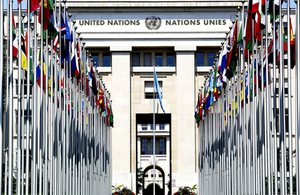UK Statement: International Labour Conference
The UK has introduced ground breaking regulations on gender pay gap reporting. Shining a light on where women are being held back is an important step in ensuring employers can take effective action.

The International Labour Conference takes place at the Palais in Geneva.
Thank you, Chair.
It a pleasure to be here at the International Labour Conference. Congratulations to the ILO on reaching its centenary year!
The UK firmly believes in the rules based international system. The work of the ILO in maintaining and improving labour standards is critical. Being in a decent job gives a person dignity, the ability to earn their own money, pay their own way, and determine their own future.
As the report of the Global Commission on the Future of Work makes clear, we are undergoing a period of significant change.
Technological innovation can both be a driver of fundamental change in the world of work and the means by which to ensure high standards of protection.
We all have a responsibility to bring an end to inequality and injustice in the world of work. Governments, employers and workers need to work closely together to push forward positive, transformative change.
The UK looks forward to the successful conclusion of the ILO’s Centenary Declaration, setting out the crucial role of the ILO in the years to come in the context of the changing world of work. We stand ready to work with you all on this important mission.
I want to focus today on one group where inequality in the labour market persists, which the draft Declaration rightly highlights.
This must be the time to achieve equality for women in the workplace once and for all. We know that if women had the same role in labour markets as men, an estimated additional $28 trillion could be added to global GDP in 2025. That’s 26% higher global GDP. We also know that, globally, more women are exploited for forced labour than men.
The UK has a strong record: the UK employment rate for women is at a joint-record high [71.8%.]. This has been achieved through a varied, inclusive approach to increase gender equality in the labour market and policies to help reconcile family and work responsibilities.
However, there is always more to be done – not least to ensure the wider cultural change where it is the norm that women will progress and can achieve seniority and financial reward equal to men.
The UK has introduced ground breaking regulations on gender pay gap reporting. Shining a light on where women are being held back is an important step in ensuring employers can take effective action.
I am very pleased to confirm today the UK’s intention to join the ILO’s Equal Pay International Coalition. We welcome the ILO’s leadership here and stand ready to support the coalition.
But nothing is more timely and relevant to women than the internationally legally binding Convention being negotiated at this conference, on eradicating violence and harassment in the world of work.
Harassment can have a significant impact on those who are subjected to it. Nobody should be subjected to unwanted conduct or be put in a compromising situation.
The #Metoo campaign has showed us this is a global issue – so it needs a global solution.
That means having strong laws on violence and harassment. We have these laws in the UK and we want to see that level of protection extended around the world. To do this we must work together across organisational, political and national differences.
As Prime Minister May noted last week, in terms of eradicating violence against women and girls, nothing could be more important than eradicating modern slavery – one of the worst forms of abuses. The UK is playing a leading role and I call on countries today, that have not yet done so, to join us in ratifying the ILO’s 2014 forced labour protocol.
I hope this Conference will adopt a Convention on Violence and Harassment at Work that covers all aspects of work, all who need protection, and which can be signed by as many countries as possible.
Everyone should be able to go to work without fear, no matter who they are, where they work or what they do.
I started by saying that this is a period of huge change in the world of work. For many people across the world, a job does not always meet every hope and dream.
The UK will continue to support the ILO in its endeavour to foster greater opportunities for all and to shape the future of work we want.